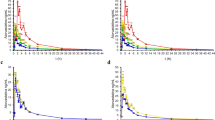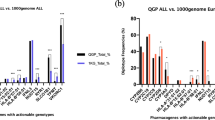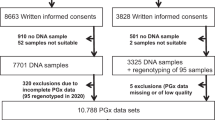Abstract
The clinical impact of pharmacogenomics remains a hot topic of current research efforts. Although pharmacogenomics of phase I metabolizing enzymes seems to have been well studied, knowledge on the clinical impact of genetic variability of phase II metabolizing enzymes and drug transporters is more limited. This paper reviews data on the pharmacogenomics of phase II metabolizing enzymes as well as of ATP binding cassette transporters and of solute carrier transporters focusing on clinical implications for drug efficacy and drug toxicity. The clinical impact of some of these polymorphisms has been well defined i.e. the association between polymorphisms of organic anion transporter polypeptides and statin induced myopathy. However, as the same drug may be substrate for different enzymes and different transporters, it is difficult to elucidate the impact of each polymorphism. Investigating the impact of multiple polymorphisms might be more clinically meaningful, although methodologically challenging.
This is a preview of subscription content, access via your institution
Access options
Subscribe to this journal
Receive 6 print issues and online access
$259.00 per year
only $43.17 per issue
Buy this article
- Purchase on Springer Link
- Instant access to full article PDF
Prices may be subject to local taxes which are calculated during checkout
Similar content being viewed by others
References
Evans W . Translating functional genomics into rational therapeutics. Science 1999; 286: 487–491.
Srinivasan B, Chen J, Cheng Ch, Conti D, Duan S, Fridley BL et al. Methods for analysis in pharmacogenomics: lessons from the Pharmacogenetics Research Network Analysis Group. Pharmacogenomics 2009; 10: 243–251.
Offit K, Mark E. . New pharmacogenomic paradigm in breast cancer treatment. Journal of Clinical Oncology 2010; 28: 4665–4673.
Cheng Q, Evans W . Cancer pharmacogernomics may require both qualitative and quantitative approaches. Cell Cycle 2005; 4: 1506–1509.
Kager L, Evans W . Pharmacogenomics of acute lymphoblastic leucemia. Current Opinion in Hematology 2006; 13: 260–265.
Huang S, Ratain M . Pharmacogenetics and pharmacogenomics of anticancer agents. a cancer journal for clinicians: CA, 2009; 59: 42–55.
Ezzeldin H, Diasio R . Genetic testing in cancer therapeutics. Clinical Cancer Research 2006; 12: 4137–4141.
Lee W, Lockhart C, Kim R, Rothenberg M . Cancer pharmacogenomics: powerful tools in cancer chemotherapy and drug development. The Oncologist 2005; 10: 104–111.
Bandrés E, Zarate R, Martinez N, Abajo A, Bitarte N, Garíia-Foncillas J . Pharmacogenomics in colorectal cancer: the first step for individualized therapy. World Journal of Gastroenterology 2007; 13: 5888–5901.
Palomaki G, Bradley L, Douglas M, Kolor K, Dotson WD . Can UGT1A1 genotyping reduce morbidity and mortality in patients with colorectal cancer treated with irinotecan? An evidence-based review. Medical Genetics 2009; 11: 21–34.
Daly AK, Aithal GP, Leathart JB, Swainsbury RA, Dang TS, Day CP. . Genetic susceptibility to diclofenac-induced hepatotoxicity: contribution of UGT2B7, CYP2C8, and ABCC2 genotypes. Gastroenterology 2007; 132: 272–281.
Sun D, Chena G, Dellingera RW, Sharmab AK . Lazarusa Ph Characterization of 17-dihydroexemestane glucuronidation: potential role of the UGT2B17 deletion in exemestane pharmacogenetics. Pharmacogenet Genomics 2010; 20: 575–585.
Klaassen CD, Aleksunes LM . Xenobiotic bile acid, and cholesterol transporters: function and regulation. Pharmacol Rev 2010; 62: 1–96.
Kalliokoski A, Niemi M . Impact of OATP transporters on pharmacokinetics. Br J Pharmacol 2009; 158: 693–705.
DeGorter M, Kim R . Hepatic drug transporters, old and new: pharmacogenomics, drug response and clinical relevance. Hepatology 2009; 50: 1014–1916.
Giacomini KM, Sugiyama Y . Membrane transporters and drug response. In: Brunton LL, Lazo JS, Parker KL, (eds) Goodman & Gilman’s the Pharmacological Basis Of Therapeutics. McGraw-Hill: New York, pp 41–70 2006.
Ho RH, Kim RB . Transporters and drug therapy: implications for drug disposition and disease. Clin Pharmacol Ther 2005; 78: 260–277.
Niemi M, Pasanen M, Neuvonen P . Organic Anion Transporting Polypeptide 1B1:a Genetically Polymorphic Transporter of Major Importance for Hepatic Drug Uptake. Pharmacol Rev 2011; 63: 157–181.
Haufroid V . Genetic polymorphisms of ATP-binding cassette transporters ABCB1 and ABCC2 and their impact on drug disposition. Curr Drug Targets 2011; 12: 631–636.
Yee SW, Chen L, Giacomini KM . Pharmacogenomics of membrane transporters: past, present and future. Pharmacogenomics 2010; 11: 475–479.
Deenen MJ, Cats A, Beijnen JH, Schellens JH . Part 2: pharmacogenetic variability in drug transport and phase I anticancer drug metabolism. Oncologist 2011; 16: 820–834.
Gottesman MM, Fojo T, Bates SE . Multidrug resistance in cancer: role of ATP-dependent transporters. Nature Rev Cancer 2002; 2: 48–58.
Cascorbi I . Role of pharmacogenetics of ATP-binding cassette transporters in the pharmacokinetics of drugs. Pharmacol Ther 2006; 112: 457–73.
Sakaeda T, Nakamura T, Okumura K . Pharmacogenetics of drug transporters and its impact on the pharmacotherapy. Curr Top Med Chem 2004; 4: 1385–1398.
Simon T, Verstuyft C, Mary-Krause M, Quteineh L, Drouet E, Meneveau N et al. Genetic determinants of response to clopidogrel and cardiovascular events. N Engl J Med 2009; 360: 363–375.
Mega JL, Close SL, Wiviott SD, Shen L, Walker JR, Simon T et al. Genetic variants in ABCB1 and CYP2C19 and cardiovascular outcomes after treatment with clopidogrel and prasugrel in the TRITON-TIMI 38 trial: a pharmacogenetic analysis. Lancet 2010; 376: 1312–1319.
Mega JL, Close SL, Wiviott SD, Shen L, Hockett RD, Brandt JT et al. Cytochrome P-450 polymorphisms and response to clopidogrel. N Engl J Med 2009; 360: 354–362.
Momary KM, Dorsch MP, Bates ER . Genetic causes of clopidogrel nonresponsiveness: which ones really count? Pharmacotherapy 2010; 30: 265–274.
Sissung TM, Baum CE, Kirkland CT, Gao R, Gardner ER, Figg WD . Pharmacogenetics of membrane transporters: an update on current approaches. Mol Biotechnol 2010; 44: 152–167.
Mielke S . Individualized pharmacotherapy with paclitaxel. Curr Opin Oncol 2007; 19: 586–589.
Velamakanni S, Wei SL, Janvilisri T, van Veen HW . ABCG transporters: structure, substrate specificities and physiological roles: a brief overview. J Bioenerg Biomembr 2007; 39: 465–471.
Ni Z, Bikadi Z, Rosenberg MF, Mao Q . Structure and function of the human breast cancer resistance protein (BCRP/ABCG2). Curr Drug Metab 2010; 11: 603–617.
Cusatis G, Gregorc V, Li J, Ingersoll RG, Verweij J, Ludovini V et al. Pharmacokinetics of ABCG2 and adverse reactions to gefitinib. J Natl Cancer Inst 2006; 98: 1739–1742.
Zhou SF, Wang LL, Di YM, Xue CC, Duan W, Li CG et al. Substrates and inhibitors of human multidrug resistance associated proteins and the implications in drug development. Curr Med Chem 2008; 15: 1981–2039.
Toyoda Y, Ishikawa T . Pharmacogenomics of human ABC transporter ABCC11 (MRP8): potential risk of breast cancer and chemotherapy failure. Anticancer Agents Med Chem 2010; 10: 617–624.
Innocenti F, Kroetz DL, Schuetz E, Dolan ME, Ramírez J, Relling M et al. Comprehensive pharmacogenetic analysis of irinotecan neutropenia and pharmacokinetics. J Clin Oncol 2009; 27: 2604–2624.
Conrad S, Kauffmann HM, Ito K, Deeley RG, Cole SP, Schrenk D . Identification of human multidrug resistance protein 1 (MRP1) mutations and characterization of a G671V substitution. J Hum Genet 2001; 46: 656–663.
Conrad S, Kauffmann HM, Ito K, Leslie EM, Deeley RG, Schrenk D et al. A naturally occurring mutation in MRP1 results in a selective decrease in organic anion transport and in increased doxorubicin resistance. Pharmacogenetics 2002; 12: 321–330.
Leslie EM, Létourneau IJ, Deeley RG, Cole SP . Functional and structural consequences of cysteine substitutions in the NH2 proximal region of the human multidrug resistance protein 1 (MRP1/ABCC1). Biochemistry 2003; 42: 5214–5224.
Létourneau IJ, Deeley RG, Cole SP . Functional characterization of non-synonymous single nucleotide polymorphisms in the gene encoding human multidrug resistance protein 1 (MRP1/ABCC1). Pharmacogenet Genomics 2005; 15: 647–657.
Marsh S, Hoskins JM . Irinotecan pharmacogenomics. Pharmacogenomics 2010; 11: 1003–1010.
Di Martino M, Arbitrio M, Leone E, Guzzi P, Rotundo M, Domenico Ciliberto D et al. Single nucleotide polymorphisms of ABCC5 and ABCG1 transporter genes correlate to irinotecan-associated gastrointestinal toxicity in colorectal cancer patients. Cancer Biology and Therapy 2011; 12: 780–787.
Roth M, Obaidat A, Hagenbuch B . OATPs, OATs and OCTs: the organic anion and cation transporters of the SLCO and SLC22A gene superfamilies. Br J Pharamcol 2012; 165: 1260–1287.
Fenner KS, Jones HM, Ullah M, Kempshall S, Dickins M, Lai Y et al. The evolution of the OATP hepatic uptake transport protein family in DMPK sciences: from obscure liver transporters to key determinants of hepatobiliary clearance. Xenobiotica 2012; 42: 28–45.
Yamakawa Y, Hamada A, Shuto T, Yuki M, Uchida T, Kai H et al. Pharmacokinetic impact of SLCO1A2 polymorphisms on imatinib disposition in patients with chronic myeloid leucemia. Clin Pharmacol Ther 2011; 90: 157–163.
Akamine Y, Miura M, Sunagawa S, Kagaya H, Yasui- Furukori N, Uno T . Influence of drug transporter polymorphisms on the pharmacokinetics of fexofenadine enantiomers. Xenobiotica 2010; 40: 782–789.
Holmes M, Shah T, Vickery C, Smeeth L, Hingorani AD, Casas JP . Fulfilling the promise of personalized medicine? Systematic review and field synopsis of pharmacogenetic studies. Plos One 2009; 4: e7960.
Burckhardt G, Burckhardt BC . In vitro and in vivo evidence of the importance of organic anion transporters (OATs) in drug therapy. Handb Exp Pharmacol 2011; 201: 29–104.
Srimaroeng C, Perry JL, Physiology Pritchard JB . structure, and regulation of the cloned organic anion transporters. Xenobiotica 2008; 38: 889–935.
Choi MK., Song IS . Organic cation transporters and their pharmacokinetic and pharmacodynamic consequences. Drug Metab Pharmacokinet 2008; 23: 243–253.
Author information
Authors and Affiliations
Corresponding author
Ethics declarations
Competing interests
The author declares no conflict of interest.
Rights and permissions
About this article
Cite this article
Yiannakopoulou, E. Pharmacogenomics of phase II metabolizing enzymes and drug transporters: clinical implications. Pharmacogenomics J 13, 105–109 (2013). https://doi.org/10.1038/tpj.2012.42
Received:
Revised:
Accepted:
Published:
Issue Date:
DOI: https://doi.org/10.1038/tpj.2012.42
Keywords
This article is cited by
-
Clinical Association Between Pharmacogenomics and Adverse Drug Reactions
Drugs (2015)
-
Consequences of Renal Failure on Non-Renal Clearance of Drugs
Clinical Pharmacokinetics (2014)



